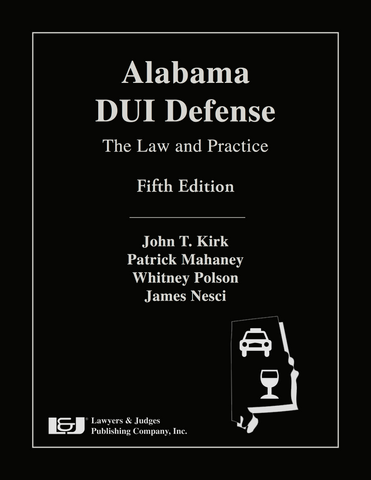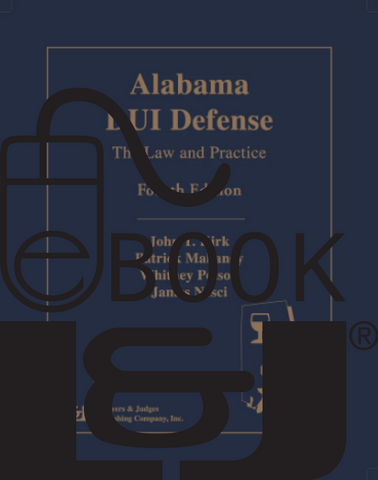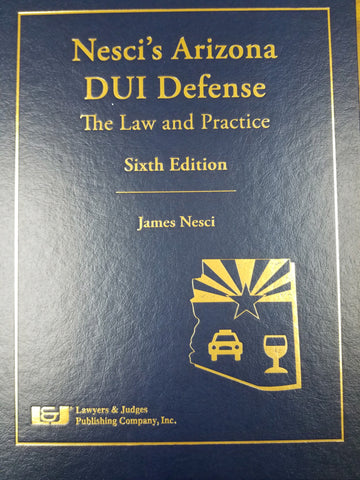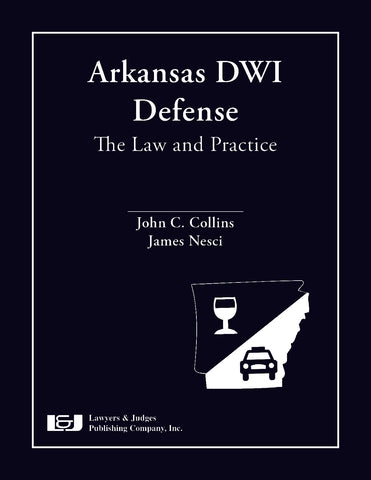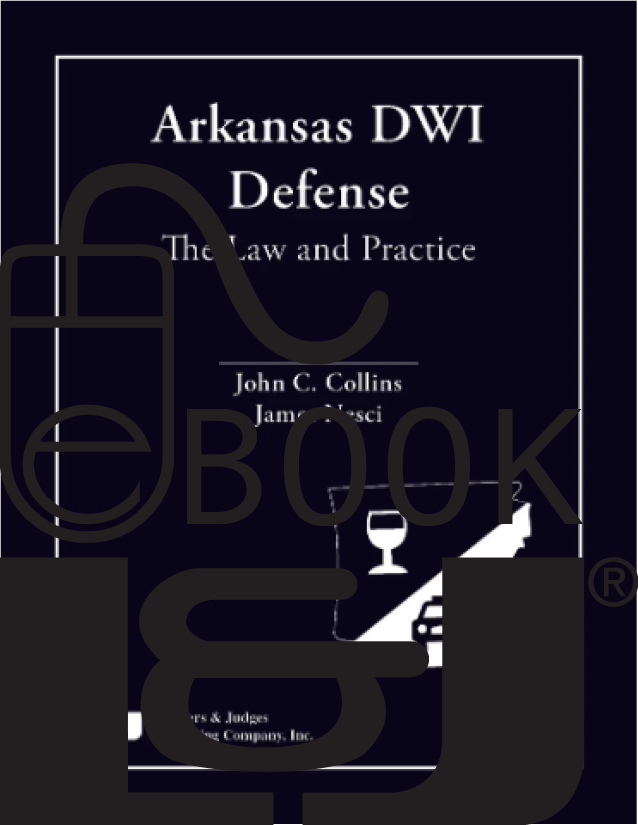
Arkansas DWI Defense: The Law and Practice PDF eBook
-
Author: John C. Collins, James Nesci
-
ISBN 10: 1-936360-43-8
-
ISBN 13: 978-1-936360-43-7
-
Copyright Date Ed: May 20, 2016
-
Pages: 400 pages
- PDF eBook
For even the most seasoned attorney admitted to practice in the State of Arkansas, defending DWI cases has always presented special challenges. Today mounting a successful defense is more difficult than ever. Now you have the advantage with Arkansas DWI Defense: The Law and Practice. This text contains the most important information to help you attain a successful verdict.
Written by John C. Collins and James Nesci, both members of the National College for DUI Defense, Arkansas DWI Defense: The Law and Practice ensures that you understand the chemical, biological and technological concepts and issues underlying DWI prosecution and defense in the State of Arkansas. The authors provide the most up-to-date information available on key areas of DWI law in Arkansas including: DWI Investigations, Driving and Field Sobriety Testing, Drug Recognition, Evaluation and Chemical Testing, Blood Alcohol Calculations, Pre-trial Investigations and Motions, Practice, Plea Offers and Agreements, DWI Trial Procedures, and more.
Lawyers & Judges has published twenty state-specific DUI defense reference books. A practitioner in Colorado raved in the Colorado Lawyer that Colorado DUI Defense: The Law and Practice is “a must-have resource” and would make “a nice gift for the lawyers in your life who practice DUI defense.” The Wisconsin Lawyer reviewer gave Wisconsin OWI Defense: The Law and Practice a touchdown review, calling the book “the best book I have read pertaining to Wisconsin operating-while-intoxicated (OWI) law, and one of the best in dealing with the substance of OWI law.”
Topics Include:
- Lawyer Advertising
- Client Relations & Representing Clients with Special Circumstances
- Driving While Intoxicated
- Arkansas Driver Control
- Pre-trial Investigations
- Pre-trial Motions Practice
- Plea Offers & Sentencing Hearings
- DWI Trial Procedures
- DWI/DUI Investigations: Driving and Field Sobriety Testing
- Drug Recognition Evaluation
- Chemical Testing
- Blood Alcohol Calculations
- Expert Witnesses
- Arkansas Case Law
- Arkansas Rules of Evidence
- Resources
Table of Contents
Tables of Cases
Preface
Chapter 1: Lawyer Advertising
1.1 Ethical Issues in Advertising
ARPC 7.1 Communications concerning a lawyer’s services
ARPC 7.2 Advertising
ARPC 7.3 Direct contact with prospective clients
ARPC 7.4 Communication of fields of practice
ARPC 7.5 Firm names and letterheads
1.2 Advertising Resources
A. Phone Book Advertising
B. Internet Advertising
C. Giveaways
D. Television
E. Print
1.3 Social Media
A. Ethical Concerns
B. Confidentiality vs. Privilege
C. The 3 Tenets of Social Media: Timeliness, Honesty, and Transparency
D. Facebook
E. Twitter
F. Social Media as a Research Tool
G. Final Thoughts on Social Media
Chapter 2: Basic Client Relations & Representing Clients with Special Circumstances
2.1 Meeting the Prospective Client
2.2 Client Intake Questions
2.3 Client Intake Interview
2.4 Retainer Agreements
2.5 Fees
2.6 IOLTA
2.7 Communication
2.8 Client File Retention
2.9 Representing the Military Client for DUI
2.10 Pilots and Merchant Marines
2.11 Non U. S. Citizens—Immigration Consequences
2.12 Canadian Travel
Chapter 3: Driving While Intoxicated
3.1 Definitions, Unlawful Acts & Penalties
3.2 Chemical Analysis of Body Substances
3.3 Underage Driving Under the Influence Law
3.4 Administrative Driver’s License Suspension
Chapter 4: Arkansas Driver Control
4.1 Overview
4.2 The Admin per se/Implied Consent Form
4.3 Implied Consent Laws for DWI (non-commercial vehicle)
4.4 DWI Temporary Permits and Ignition Interlocks
4.5 Additional Penalties
4.6 Administration of the Chemical Tests
4.7 Testing required for certain accidents
4.8 DUI Underage
4.9 Commercial Vehicle and Commercial License Holders
4.10 Suspension Procedure
4.11 Notice of Suspension
Chapter 5: Pre-Trial Investigations
5.1 Overview
5.2 Proper Filing Techniques
5.3 Visiting the Scene
5.4 Photography and Videos
5.5 Diagrams and Aerial Photography
5.6 Accident Reconstruction
5.7 Event Data Recorders (Black Boxes)
5.8 Roadblock (a.k.a. “DWI Checkpoint”) Investigations
5.9 Pretrial Interviews, Law Enforcement
5.10 Pretrial Interviews, Emergency Personnel
5.11 Pretrial Interviews, Civilians
5.12 Prior Offenses
Chapter 6: Pre-Trial Motions Practice
6.1 Overview
6.2 Procedural Motions
6.3 Substantive Motions
6.4 Motions in Limine
6.5 Evidentiary Hearings
Chapter 7: Plea Offers & Sentencing Hearings
7.1 Overview: Plea Offers
7.2 Waiver of Rights
7.3 Collateral Consequences
7.4 Immigration
7.5 Exposure of Prior Offenses
7.6 Subsequent Offenses
7.7 Out of State, Timing and Juvenile Prior Offenses
7.8 Misdemeanor Plea Offers
7.9 Felony Plea Offers
7.10 Sentencing
Chapter 8: Trial
8.1 Overview
8.2 Voir Dire and Jury Selection
8.3 Jury Instructions
8.4 Opening Statements
8.5 Cross-Examination
8.6 Direct Examination
8.7 Closing Argument
8.8 Sentencing
Chapter 9: DWI/DUI Investigations: Driving and Field Sobriety Testing
9.1 Overview: National Highway Traffic Safety Administration (NHTSA)
9.2 Driving Behavior
9.3 Standardized Field Sobriety Testing (SFST) Validation Studies
9.4 Legal Analysis and Summary of the SFST Validation Studies
9.5 Standardized Field Sobriety Test Battery
9.6 Horizontal Gaze Nystagmus (HGN)
9.7 Walk and Turn
9.8 One-Leg-Stand
9.9 Commonly Used Non-Standardized/Non-Validated Field Sobriety Tests
9.10 Advanced Roadside Impaired Driving Enforcement (ARIDE)
9.11 Videotaping the Driving and Investigation
References
Chapter 10: Drug Recognition Evaluation
10.1 Overview
10.2 DRE Statutory Law
10.3 Per Se Statutes Comparison
10.4 Impairment Statutes Comparison
10.5 Arkansas DRE Laws
10.6 Defenses
10.7 Implied Consent Laws Comparison
10.8 DRE Case Law
10.9 The 12-Step DRE Protocol
10.10 Deconstruction and Analysis of the 12-Step DRE Protocol
10.11 Effects of Various Drugs
10.12 Drug Evaluation Classification Protocol (DECP)
10.13 Drug Evaluation Classification Training Program
Chapter 11: Chemical Testing
11.1 Preliminary Breath Testing
11.2 Law
11.3 Safeguards
11.4 PBT Devices
11.5 Henry’s Law and the Blood-to-Breath Ratio
11.6 Evidential Breath Testing
11.7 Infrared Light Absorption
11.8 Principles and Theory of Dry Gas Standards
11.9 Gas Tank Instrument Errors
11.10 Principles of the Fuel Cell Sensor
11.11 Principles of the Infrared Cell
11.12 General Operating Principles
11.13 Interferents
11.14 The Operating Environment
11.15 Breath Testing: Methods of Attack
11.16 Calibration
11.17 Arkansas Department of Health, Division of Alcohol Testing
11.18 Statutory Requirements for Admissibility of Breath Test Results
11.19 Blood Testing: From the Vein to the Lab
11.20 Headspace Gas Chromatography
11.21 Uncertainty of Measurement
11.22 Blood Testing for Drugs
11.23 Blood Draws: Statutory Admissibility, Sample Preservation and Independent Testing
11.24 Secondary Blood Testing
References
Appendix
Chapter 12: Blood Alcohol Calculations for Attorneys
12.1 Blood Alcohol Calculations for Attorneys
12.2 Determining the One-Drink Potential
12.3 Elimination and Retrograde Extrapolation
12.4 White’s Retrograde Extrapolation
12.5 Partition Ratio Conversions
12.6 Unit Conversions
Chapter 13: Expert Witnesses
13.1 Overview
13.2 Pretrial Preparation
13.3 Direct Examination of the Defense Expert Witness
13.4 Cross of the State’s Expert Witness
13.5 Direct Examination of the State’s Expert as a Defense Witness
Chapter 14: DWI Jury Trial Warpack
14.1 Actual Physical Control (APC)
14.2 Aggravation
14.3 Appeals and Special Actions
14.4 Arrest
14.5 Authentication
14.6 Blood Draws
14.7 Breath Testing
14.8 Burden of Proof
14.9 Chain of Custody
14.10 Circumstantial Evidence
14.11 Closing Arguments—Ethical Considerations
14.12 Collateral Estoppel in DUI Cases
14.13 Comment of Defendant’s Silence
14.14 Confrontation
14.15 Corpus
14.16 Court Rules
14.17 Credibility of Witnesses
14.18 Destruction of Evidence
14.19 Discovery
14.20 Directed Verdict
14.21 Double Jeopardy
14.22 DRE: Drug Recognition Evaluation Admissibility
14.23 Due Process
14.24 Evidence
14.25 Expert Witnesses
14.26 Field Sobriety Test Admissibility
14.27 Foundation
14.28 HGN
14.29 Impeachment
14.30 Independent Test
14.31 Jurors and Jury Selection
14.32 Jury Deliberations
14.33 Jury Instructions
14.34 Jury Trial Right
14.35 Motions
14.36 Miranda
14.37 Necessity Defense
14.38 Driver Control
14.39 Opinion Testimony
14.40 Pleas and Plea Agreements
14.41 Prior Convictions
14.42 Probable Cause
14.43 Reasonable Suspicion
14.44 Record Preservation for Appeal
14.45 Refusal to Submit to Chemical Testing
14.46 Relation Back
14.47 Replicate Testing
14.48 Restitution
14.49 Right to Counsel
14.50 Roadblocks (a.k.a. “DUI Checkpoints”)
14.51 Speedy trial
14.52 Searches
14.53 Sentencing
14.54 Subpoena
14.55 Voir dire
14.56 Voluntariness of Statements
14.60 Warrants
Appendix A: Arkansas Rules of Evidence
Appendix B: The Aging Process and Field Sobriety Tests
by Mimi Coffey, Esq.
Appendix C: DWI—Modern Day Salem Witch Hunts
by Mimi Coffey, Esq.
Appendix D: DWI—Fear and the DWI Field Sobriety Tests
by Mimi Coffey, Esq.
About the Author
Index

